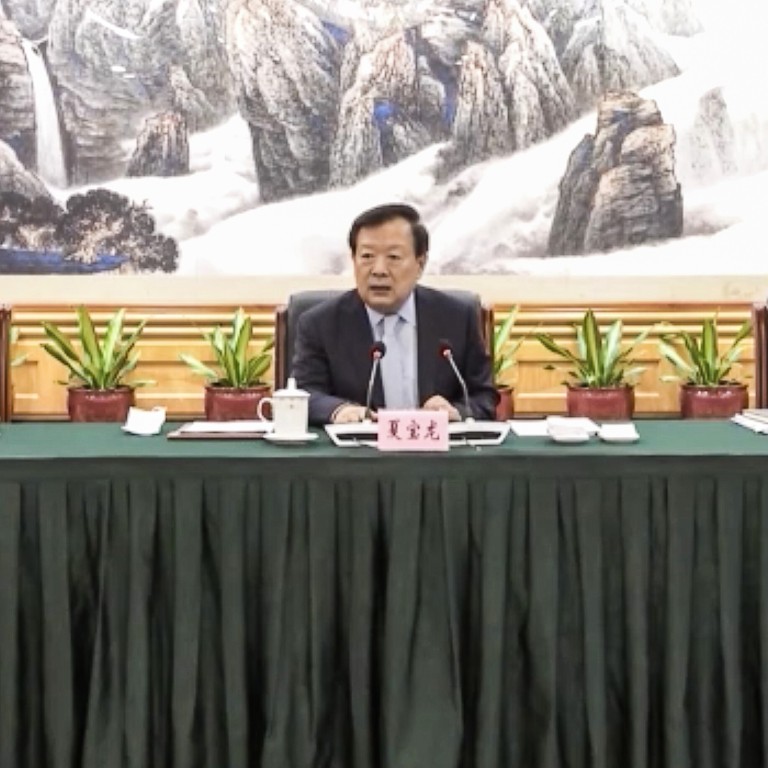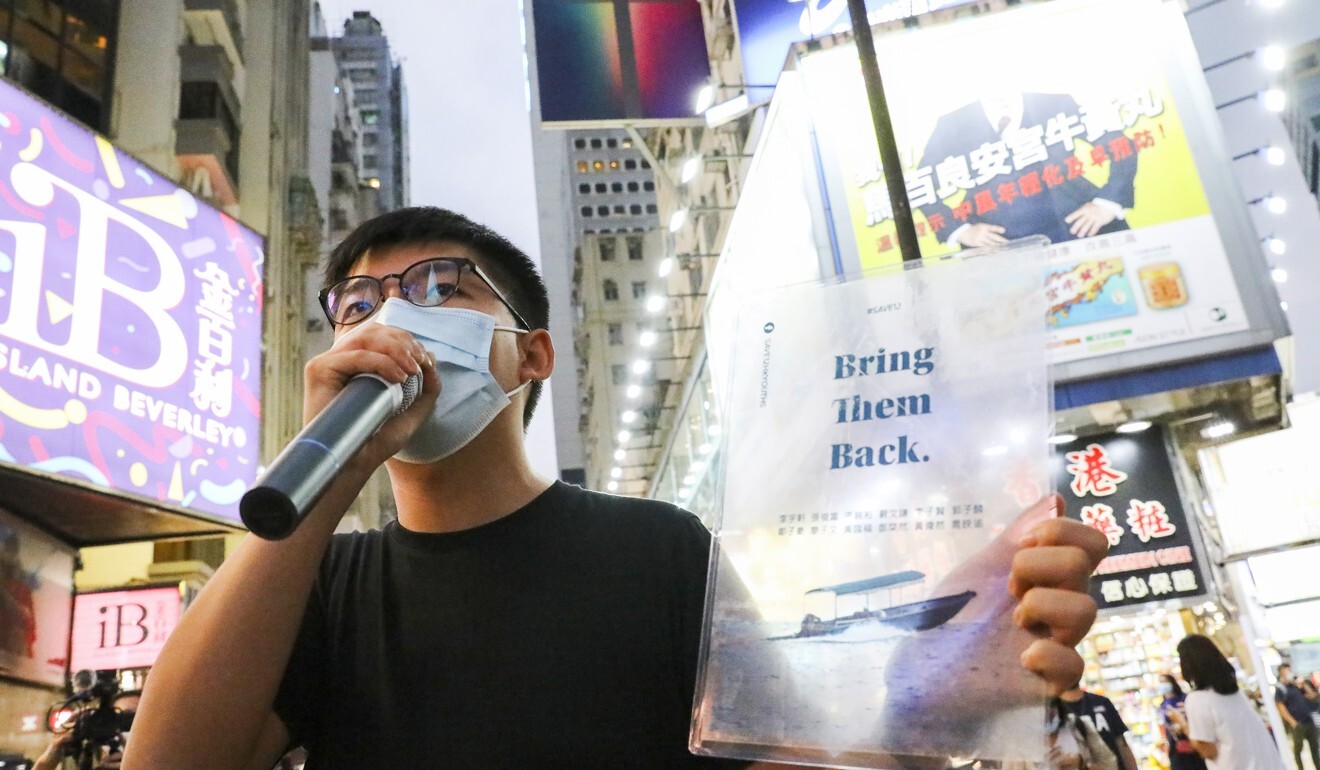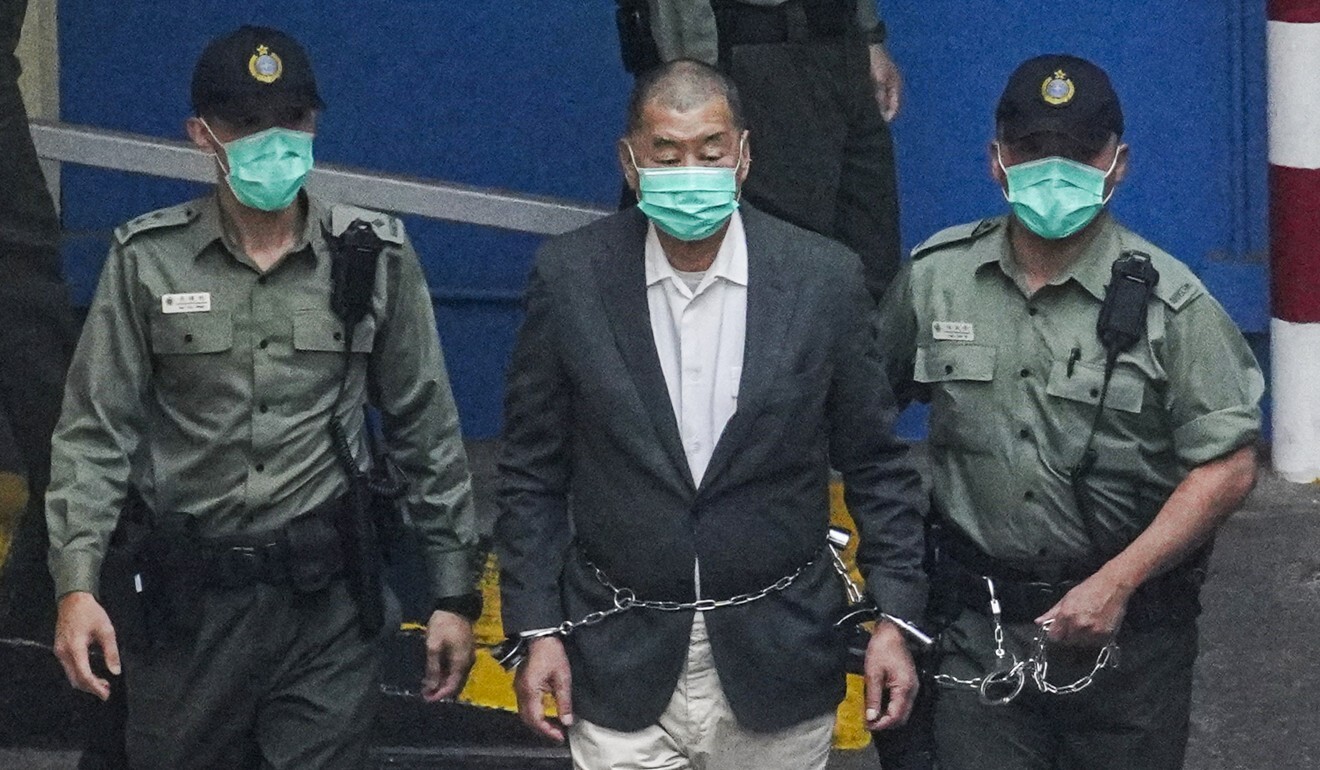
Senior Beijing official reaffirms importance of ‘patriots’ running Hong Kong at seminar, as pro-establishment attendees agree on need for political overhaul
- Xia Baolong, director of the Hong Kong and Macau Affairs Office, tells seminar in Shenzhen that ‘patriots governing Hong Kong’ is paramount to the future of ‘one country, two systems’
- State media reports that those in attendance agreed ‘the city’s electoral systems should be improved as soon as possible’
A top Beijing official overseeing Hong Kong affairs has reaffirmed the importance of “patriots” governing the city in a speech to pro-establishment figures in Shenzhen, with state media reporting that those in attendance unanimously agreed that the time had come for a comprehensive overhaul of the local political system.
Xia Baolong, director of the State Council’s Hong Kong and Macau Affairs Office, said on Monday that he believed that the majority of the city’s residents were indeed patriotic, and that it was paramount to put them in charge to ensure that the “one country, two systems” principle could continue to be implemented in the long run.
“The central government’s firm determination in implementing ‘one country, two systems’ will not change … We must improve the relevant systems to ensure that Hong Kong’s organs of political power are firmly in the hands of real patriots,” Xia declared, according to state news agency Xinhua.
“To love the country is to love the People’s Republic of China … The central government’s relevant authorities will continue to listen to the views of various sectors in Hong Kong.”
Xia’s remarks came as he concluded a two-day seminar in Shenzhen to listen to the views of Hong Kong’s pro-establishment leaders on reworking the city’s electoral and political systems to ensure public office holders were sufficiently patriotic, a precept cited by President Xi Jinping in January as fundamental to the city’s long-term stability and prosperity.
Reveal of Beijing’s political inoculation plan for Hong Kong looms at ‘two sessions’
Xinhua reported that during the seminar, attendees unanimously agreed with Xia’s stance, maintaining that no country in the world would allow any part of itself to be run by those deemed unpatriotic.
“The attendees also agreed that in recent years, chaos had repeatedly emerged in Hong Kong’s political circles because ‘patriots governing Hong Kong’ was not fully implemented, so the city’s electoral systems should be improved as soon as possible,” the Xinhua report said.
“The attendees said authorities must also strengthen the assessment and selection of talented politicians, boost national education, and improve the media and public opinion environment … so that Hong Kong can resolve its deep-seated socio-economic problems.”
The seminar in Shenzhen came days before the launch of the annual plenary sessions of the Chinese People’s Political Consultative Conference (CPPCC), the country’s top political advisory body, and the National People’s Congress (NPC), its top legislature.
Sources previously told the Post that apart from endorsing China’s next five-year plan, the NPC and CPPCC would scrutinise Beijing’s plans to shake up the city’s electoral systems based on the “patriots” principle.
Hong Kong elections to proceed this year but official in dark over format
While the first part of the Shenzhen seminar on Sunday focused on how political changes could help the city reboot its economy, the second day was centred on how both the electoral and education systems needed to be overhauled.
Among those who attended the seminar on Monday were Basic Law Committee member and lawmaker Priscilla Leung Mei-fun, veteran pro-Beijing businessman Chan Wing-kee, vice-chairman of the Hong Kong Federation of Education Workers Tang Fei, and Adam Kwok Kai-fai, an executive director of Sun Hung Kai Properties.
Earlier on Monday, the pro-establishment Bauhinia Magazine published a 9,800-word transcript of a speech delivered by Xia at a closed-door seminar in Beijing last week.
In the complete transcript of the speech, Xia called for serious punishments to be handed down to three prominent opposition figures, whom he described as being “extremely bad ones among the anti-China destroyers of Hong Kong”.

“The small minority of people who called for foreign forces to interfere with Hong Kong affairs … are destroyers of ‘one country, two systems’; we must not allow them to gain any of Hong Kong’s public power,” Xia was quoted as saying.
“[They] should not be merely banned from infiltrating any public office in Hong Kong, but also strictly punished in accordance with the law for their illegal acts … The minority of people who oppose China and mess up Hong Kong will only cause disasters, including destruction, instability and terror.”
Lai is currently facing a charge of colluding with foreign forces under the Beijing-imposed national security law, while Tai and Wong were among 47 opposition activists charged on Sunday with conspiring to subvert state power under the legislation. Wong is also currently serving a 13½-month prison term handed down in December for incitement and organising an unauthorised assembly in 2019.

In his speech, Xia warned that if authorities allowed foreign forces to meddle in Hong Kong’s political and electoral affairs, it would not bode well for the city.
“Just think about it, what will be Hong Kong’s future? Would the city have peace? Can it maintain its status as an international finance, trading and shipping centre?” he asked.
“Can [authorities] solve the important livelihood issues such as housing and employment, which are Hong Kong residents’ top concerns? Can ‘one country, two systems’ continue?”
Bauhinia’s transcript of last week’s speech, which also called for the full implementation of the principle of “patriots governing Hong Kong”, was twice as long as an abridged version released by Xinhua on the day it was given.

Asked on Monday if she raised any proposals at the seminar, Priscilla Leung, who is also a law professor at City University, said that she had been calling for the establishment of a committee to vet candidates in various local elections, as the existing system could allow for inconsistencies, given that it relied on the decisions of individual electoral officials.
“Whether it’s their quality or political morals, no elected or appointed public administrators should cause Hong Kong to be stuck in paralysis and internal strife, or even move towards self-destruction,” she said.
“We need to demonstrate ‘patriots governing Hong Kong’ in the city’s education, politics and law.”
Leung accused some past candidates of signing declarations of allegiance, only to support independence and self-determination after becoming district councillors, saying such behaviour was unacceptable. Implementing the precept of “patriots governing Hong Kong” would make the city better, she continued, and would persuade Beijing to continue implementing “one country, two systems”.
47 Hong Kong opposition activists charged with conspiring to subvert state power
Pro-Beijing politician Chan Wing-kee, formerly a standing committee member of the CPPCC, said it was discussed in the seminar whether Hong Kong’s deputies to consultative conference the NPC could replace district councillors on the 1,200-member Election Committee that will pick the city’s leader next year.
“Many people hoped that the NPC and CPPCC delegates could play a bigger role in the city’s governance,” he said. “The district councillors have 117 seats on the committee – that should be reduced or even cut [entirely]; the councillors don’t need to take part in the committee.”
Tang Fei, meanwhile, said it was not just the city’s political system that needed to be overhauled, but the education sector as well.
“In the past, it was worrying that many [teachers’] values failed to completely align with the provisions in the Chinese constitution and the Basic Law,” he said.
“I hope that through education and political reforms, the wrongs can be corrected.”
Xia had also mentioned education as an area of concern in the unabridged transcript of his previous remarks released on Monday.
“Whether it is in the executive, legislative and judicial organs of political power, or other areas such as district councils, education and the media, a firm situation of ‘patriots governing Hong Kong’ has yet to be established,” he was quoted as saying.
National security law: major moves to ensure ‘patriots’ take charge
The opposition’s control of almost all of the city’s district councils was “a worrying issue”, Xia added, accusing them of turning the community-level bodies into “highly politicised battlegrounds”.
“They used the platform to advocate for ‘Hong Kong independence’, resist the governance of the central government and incite dissatisfaction with the mainland,” he said of the opposition councillors. “They used this platform to arbitrarily obstruct the administration of the Hong Kong government.”
Xia also said Benny Tai’s “10-step mutual destruction plan”, which predicted what could happen should the opposition win a majority in the Legislature Council and gain greater influence on the Election Committee, was a “road map to seize power” by electing the leader they favoured.
He accused the opposition of seeking not only to “mess up Hong Kong, but also to mess up the mainland, and subvert the leadership of the Chinese Communist Party and the socialist system with Chinese characteristics”.
“They are very vicious in their intentions,” he added.


